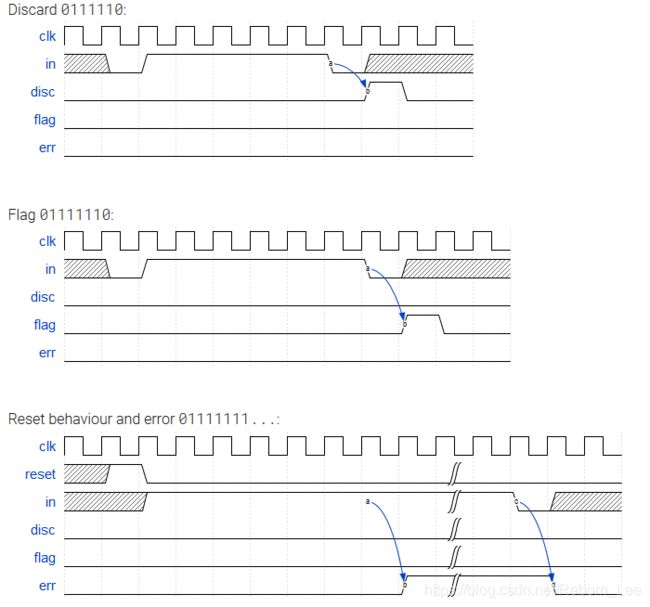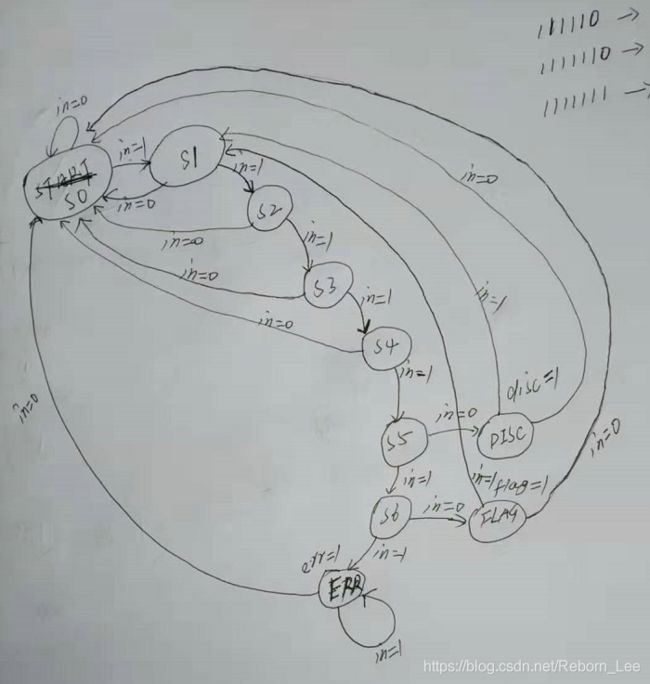- HDLBits刷题Day23,3.2.5.7 Simple FSM 3 (asynchronous reset) - 3.2.5.8 Simple FSM 3 (synchronous reset)
weixin_52312830
HDLBits刷题fpga开发算法硬件工程
联系3.2.5.5和3.2.5.6来看3.2.5.7SimpleFSM3(asynchronousreset)问题描述下面是一输入一输出四状态的摩尔状态机的状态转移表。实现这个状态机。包括将FSM重置为状态A的异步重置。代码:moduletop_module(inputclk,inputin,inputareset,outputout);//reg[1:0]state,next_state;par
- HDLBits_Verilog刷题笔记Verilog Language Basics(一)
cascleright1
fpga开发硬件架构
前言这个刷题笔记是给自己复习巩固用的,包括自己在刷题的时候遇到的问题,思考,以及看了一些大佬的笔记和答案进行整理和扩充。git开源solutionshttps://github.com/viduraakalanka/HDL-Bits-Solutionsb站up脱发秘籍搬运工,呜呜这个up不管我学什么都有教程,永远也逃不开脱发的世界~https://space.bilibili.com/318808
- USTC Verilog OJ Solutions
Daniel_187
其他fpga开发VerilogHDLrisc-v
科大OJ其对应的英文版:HDLBits刷题网站01输出1moduletop_module(outputone);assignone=1;endmodule02输出0moduletop_module(outputzero);//Modulebodystartsaftersemicolonassignzero=0;endmodule03wiremoduletop_module(inputin,outp
- FPGA快速入门路径
zuoph
FPGA+人工智能电子技术fpga开发硬件工程
适合新手的FPGA入门路径总体路径规划基础学习-verilog语言verilog语言学习,推荐verilog数字系统设计一书,讲解比较详实和全面。练习推荐使用https://hdlbits.01xz.net/,将所有上面例题自己做一遍,便可做到初步掌握硬件设计语言的使用,想要精通还得自己多看多练,尤其是多练。基础学习-数字电路与系统这方面的书很多,推荐数字设计原理与实践一书,简单的过一遍,以后用到
- 「HDLBits题解」CS450
UESTC_KS
HDLBits题解fpga开发Verilog
本专栏的目的是分享可以通过HDLBits仿真的Verilog代码以提供参考各位可同时参考我的代码和官方题解代码或许会有所收益题目链接:Cs450/timer-HDLBitsmoduletop_module(inputclk,inputload,input[9:0]data,outputtc);reg[9:0]cnt;always@(posedgeclk)beginif(load)cnt<=data
- Verilog刷题[hdlbits] :Bcdadd100
卡布达吃西瓜
verilogfpga开发veriloghdlbits
题目:Bcdadd100YouareprovidedwithaBCDone-digitaddernamedbcd_faddthataddstwoBCDdigitsandcarry-in,andproducesasumandcarry-out.为您提供了一个名为bcd_fadd的BCD一位数加法器,它将两个BCD数字相加并带入,并生成一个和和并带入。modulebcd_fadd(input[3:0]
- Verilog刷题[hdlbits] :Adder100i
卡布达吃西瓜
verilogverilogfpga开发hdlbits
题目:Adder100iCreatea100-bitbinaryripple-carryadderbyinstantiating100fulladders.Theadderaddstwo100-bitnumbersandacarry-intoproducea100-bitsumandcarryout.Toencourageyoutoactuallyinstantiatefulladders,als
- 「HDLBits题解」Verification: Writing Testbenches
UESTC_KS
HDLBits题解fpga开发Verilog
本专栏的目的是分享可以通过HDLBits仿真的Verilog代码以提供参考各位可同时参考我的代码和官方题解代码或许会有所收益题目链接:Tb/clock-HDLBits`timescale1ps/1psmoduletop_module();parametertime_period=10;regclk;initialclk=0;alwaysbegin#(time_period/2)clk=~clk;e
- 「HDLBits题解」Build a circuit from a simulation waveform
UESTC_KS
HDLBits题解fpga开发Verilog
本专栏的目的是分享可以通过HDLBits仿真的Verilog代码以提供参考各位可同时参考我的代码和官方题解代码或许会有所收益题目链接:Sim/circuit1-HDLBitsmoduletop_module(inputa,inputb,outputq);//assignq=a&b;//Fixmeendmodule题目链接:Sim/circuit2-HDLBitsmoduletop_module(i
- 「HDLBits题解」Building Larger Circuits
UESTC_KS
HDLBits题解fpga开发Verilog
本专栏的目的是分享可以通过HDLBits仿真的Verilog代码以提供参考各位可同时参考我的代码和官方题解代码或许会有所收益题目链接:Exams/review2015count1k-HDLBitsmoduletop_module(inputclk,inputreset,output[9:0]q);always@(posedgeclk)beginif(reset)q=0)if(cnt<999)cnt
- 「HDLBits题解」Finite State Machines
UESTC_KS
HDLBits题解fpga开发Verilog
本专栏的目的是分享可以通过HDLBits仿真的Verilog代码以提供参考各位可同时参考我的代码和官方题解代码或许会有所收益题目链接:Fsm1-HDLBitsmoduletop_module(inputclk,inputareset,//AsynchronousresettostateBinputin,outputout);//parameterA=0,B=1;regstate,next_stat
- 【Verilog】HDLBits刷题 03 Verilog语言(2)(未完)
圆喵喵Won
fpga开发
二、模块(module)1.实例化Thefigurebelowshowsaverysimplecircuitwithasub-module.Inthisexercise,createoneinstanceofmodulemod_a,thenconnectthemodule'sthreepins(in1,in2,andout)toyourtop-levelmodule'sthreeports(wir
- 「HDLBits题解」Cellular automata
UESTC_KS
HDLBits题解fpga开发Verilog
本专栏的目的是分享可以通过HDLBits仿真的Verilog代码以提供参考各位可同时参考我的代码和官方题解代码或许会有所收益题目链接:Rule90-HDLBitsmoduletop_module(inputclk,inputload,input[511:0]data,output[511:0]q);always@(posedgeclk)beginif(load)q<=data;elseq<={1'
- 「HDLBits题解」Shift Registers
UESTC_KS
HDLBits题解fpga开发Verilog
本专栏的目的是分享可以通过HDLBits仿真的Verilog代码以提供参考各位可同时参考我的代码和官方题解代码或许会有所收益题目链接:Shift4-HDLBitsmoduletop_module(inputclk,inputareset,//asyncactive-highresettozeroinputload,inputena,input[3:0]data,outputreg[3:0]q);a
- 「HDLBits题解」Latches and Flip-Flops
UESTC_KS
HDLBits题解fpga开发Verilog
本专栏的目的是分享可以通过HDLBits仿真的Verilog代码以提供参考各位可同时参考我的代码和官方题解代码或许会有所收益题目链接:Dff-HDLBitsmoduletop_module(inputclk,//Clocksareusedinsequentialcircuitsinputd,outputregq);////Useaclockedalwaysblock//copydtoqatever
- 「HDLBits题解」Counters
UESTC_KS
HDLBits题解fpga开发Verilog
本专栏的目的是分享可以通过HDLBits仿真的Verilog代码以提供参考各位可同时参考我的代码和官方题解代码或许会有所收益题目链接:Count15-HDLBitsmoduletop_module(inputclk,inputreset,//Synchronousactive-highresetoutput[3:0]q);always@(posedgeclk)beginif(reset)q<=0;
- verilog语法进阶
FPGA中国创新中心
FPGA学习fpga开发verilogfpga硬件工程
文章目录前言一、always块(alwaysblock)二、if语句三、case语句四、casez语句五、三目运算(ternaryconditionaloperator)六、递减运算符(reduction)七、for循环语句八、实例化多个模块(generate)总结前言 本文是针对verilog基础语法做进一步的学,通过网站HDLbits中的代码和例子来展开本文要讨论的内容。HDLbits是一个
- 「HDLBits题解」Popcount255
UESTC_KS
HDLBits题解Verilog
本专栏的目的是分享可以通过HDLBits仿真的Verilog代码以提供参考各位可同时参考我的代码和官方题解代码或许会有所收益题目链接:Popcount255-HDLBitsmoduletop_module(input[254:0]in,outputreg[7:0]out);integeri;always@(*)beginout=0;for(i=0;i>i&1)out=out+1;elseout=o
- 「HDLBits题解」Adder100i
UESTC_KS
HDLBits题解Verilog
本专栏的目的是分享可以通过HDLBits仿真的Verilog代码以提供参考各位可同时参考我的代码和官方题解代码或许会有所收益题目链接:Adder100i-HDLBitsmoduletop_module(input[99:0]a,b,inputcin,output[99:0]cout,output[99:0]sum);add1Add0(a[0],b[0],cin,sum[0],cout[0]);ge
- 「HDLBits题解」Ringer
UESTC_KS
HDLBits题解Verilog
本专栏的目的是分享可以通过HDLBits仿真的Verilog代码以提供参考各位可同时参考我的代码和官方题解代码或许会有所收益题目链接:Ringer-HDLBitsmoduletop_module(inputring,inputvibrate_mode,outputringer,//Makesoundoutputmotor//Vibrate);assignmotor=vibrate_mode?(ri
- 「HDLBits题解」Bcdadd100
UESTC_KS
HDLBits题解Verilog
本专栏的目的是分享可以通过HDLBits仿真的Verilog代码以提供参考各位可同时参考我的代码和官方题解代码或许会有所收益题目链接:Bcdadd100-HDLBitsmoduletop_module(input[399:0]a,b,inputcin,outputcout,output[399:0]sum);wire[99:0]t;genvari;bcd_faddu0(a[3:0],b[3:0],
- 【Verilog】HDLBits题解——Circuits/Sequential Logic
wjh776a68
#Verilog入门verilogHDLBitsfpga
SequentialLogicLatchesandFlip-FlopsDflip-flop题目链接moduletop_module(inputclk,//Clocksareusedinsequentialcircuitsinputd,outputregq);////Useaclockedalwaysblock//copydtoqateverypositiveedgeofclk//Clockedal
- 【Verilog】HDLBits题解——Verilog Language
wjh776a68
#Verilog入门HDLBitsVerilog题解
BasicsSimplewire题目链接moduletop_module(inputin,outputout);assignout=in;endmoduleFourwires题目链接moduletop_module(inputa,b,c,outputw,x,y,z);assignw=a;assignx=b;assigny=b;assignz=c;endmoduleInverter题目链接modul
- 【Verilog】HDLBits题解——Circuits/Combinational Logic
wjh776a68
#Verilog入门VerilogHDLBits题解
CombinationalLogicBasicGatesWire题目链接moduletop_module(inputin,outputout);assignout=in;endmoduleGND题目链接moduletop_module(outputout);assignout=0;endmoduleNOR题目链接moduletop_module(inputin1,inputin2,outputou
- 【Verilog】HDLBits题解——Verification: Writing Testbenches
wjh776a68
#Verilog入门verilogHDLBitsfpga
Clock题目链接moduletop_module();regclk;initialbeginclk=0;forever#5clk=~clk;enddutdut_inst(.clk(clk));endmoduleTestbench1题目链接moduletop_module(outputregA,outputregB);////generateinputpatternshereinitialbegi
- HDLBits Bcdadd100
yezhangyinge
Verilog题解verilog
该题是根据已经写好的十进制加法器(BCDone-digitadder)module来构建100位十进制加法器BCDone-digitadder如下modulebcd_fadd{input[3:0]a,input[3:0]b,inputcin,outputcout,output[3:0]sum);分析显然可以根据二进制的100位加法器的思路,先进行初始化,但是此时我们无法使用简单的寄存器操作来实现功
- HDLbits Conwaylife题目的一种解法
WaterSplash
fpgaverilog
前言最近在刷HDLBits准备今年的提前批和人秋招,目前刷到有限状态机后,发现前面的大部分题目比较基础。目前比较有难度和有意思的题目就是Conwaylife,二维元胞自动机。这里仅提供笔者自己的解法。解题思路比较好想到的方法就是暴力枚举所有情况,给出该情况下所有的相邻坐标。思考过后觉得暴力枚举容易出现遗漏的情况。有没有一种通用的方法可以处理所有坐标呢。参考生命游戏的前两道题,使用另外两个向量,表示
- 「HDLBits题解」Always casez
UESTC_KS
HDLBits题解fpga开发Verilog
本专栏的目的是分享可以通过HDLBits仿真的Verilog代码以提供参考各位可同时参考我的代码和官方题解代码或许会有所收益题目链接:Alwayscasez-HDLBits//synthesisverilog_input_versionverilog_2001moduletop_module(input[7:0]in,outputreg[2:0]pos);always@(*)begincasez(
- 「HDLBits题解」Always nolatches
UESTC_KS
HDLBits题解Verilog
本专栏的目的是分享可以通过HDLBits仿真的Verilog代码以提供参考各位可同时参考我的代码和官方题解代码或许会有所收益题目链接:Alwaysnolatches-HDLBits//synthesisverilog_input_versionverilog_2001moduletop_module(input[15:0]scancode,outputregleft,outputregdown,o
- 「HDLBits题解」Module cseladd
UESTC_KS
HDLBits题解fpga开发Verilog
本专栏的目的是分享可以通过HDLBits仿真的Verilog代码以提供参考各位可同时参考我的代码和官方题解代码或许会有所收益题目链接:Modulecseladd-HDLBitsmoduletop_module(input[31:0]a,input[31:0]b,output[31:0]sum);wirecout1,cout2,cout3;wire[15:0]t1,t2,t3,t4;reg[15:0
- java数字签名三种方式
知了ing
javajdk
以下3钟数字签名都是基于jdk7的
1,RSA
String password="test";
// 1.初始化密钥
KeyPairGenerator keyPairGenerator = KeyPairGenerator.getInstance("RSA");
keyPairGenerator.initialize(51
- Hibernate学习笔记
caoyong
Hibernate
1>、Hibernate是数据访问层框架,是一个ORM(Object Relation Mapping)框架,作者为:Gavin King
2>、搭建Hibernate的开发环境
a>、添加jar包:
aa>、hibernatte开发包中/lib/required/所
- 设计模式之装饰器模式Decorator(结构型)
漂泊一剑客
Decorator
1. 概述
若你从事过面向对象开发,实现给一个类或对象增加行为,使用继承机制,这是所有面向对象语言的一个基本特性。如果已经存在的一个类缺少某些方法,或者须要给方法添加更多的功能(魅力),你也许会仅仅继承这个类来产生一个新类—这建立在额外的代码上。
- 读取磁盘文件txt,并输入String
一炮送你回车库
String
public static void main(String[] args) throws IOException {
String fileContent = readFileContent("d:/aaa.txt");
System.out.println(fileContent);
- js三级联动下拉框
3213213333332132
三级联动
//三级联动
省/直辖市<select id="province"></select>
市/省直辖<select id="city"></select>
县/区 <select id="area"></select>
- erlang之parse_transform编译选项的应用
616050468
parse_transform游戏服务器属性同步abstract_code
最近使用erlang重构了游戏服务器的所有代码,之前看过C++/lua写的服务器引擎代码,引擎实现了玩家属性自动同步给前端和增量更新玩家数据到数据库的功能,这也是现在很多游戏服务器的优化方向,在引擎层面去解决数据同步和数据持久化,数据发生变化了业务层不需要关心怎么去同步给前端。由于游戏过程中玩家每个业务中玩家数据更改的量其实是很少
- JAVA JSON的解析
darkranger
java
// {
// “Total”:“条数”,
// Code: 1,
//
// “PaymentItems”:[
// {
// “PaymentItemID”:”支款单ID”,
// “PaymentCode”:”支款单编号”,
// “PaymentTime”:”支款日期”,
// ”ContractNo”:”合同号”,
//
- POJ-1273-Drainage Ditches
aijuans
ACM_POJ
POJ-1273-Drainage Ditches
http://poj.org/problem?id=1273
基本的最大流,按LRJ的白书写的
#include<iostream>
#include<cstring>
#include<queue>
using namespace std;
#define INF 0x7fffffff
int ma
- 工作流Activiti5表的命名及含义
atongyeye
工作流Activiti
activiti5 - http://activiti.org/designer/update在线插件安装
activiti5一共23张表
Activiti的表都以ACT_开头。 第二部分是表示表的用途的两个字母标识。 用途也和服务的API对应。
ACT_RE_*: 'RE'表示repository。 这个前缀的表包含了流程定义和流程静态资源 (图片,规则,等等)。
A
- android的广播机制和广播的简单使用
百合不是茶
android广播机制广播的注册
Android广播机制简介 在Android中,有一些操作完成以后,会发送广播,比如说发出一条短信,或打出一个电话,如果某个程序接收了这个广播,就会做相应的处理。这个广播跟我们传统意义中的电台广播有些相似之处。之所以叫做广播,就是因为它只负责“说”而不管你“听不听”,也就是不管你接收方如何处理。另外,广播可以被不只一个应用程序所接收,当然也可能不被任何应
- Spring事务传播行为详解
bijian1013
javaspring事务传播行为
在service类前加上@Transactional,声明这个service所有方法需要事务管理。每一个业务方法开始时都会打开一个事务。
Spring默认情况下会对运行期例外(RunTimeException)进行事务回滚。这
- eidtplus operate
征客丶
eidtplus
开启列模式: Alt+C 鼠标选择 OR Alt+鼠标左键拖动
列模式替换或复制内容(多行):
右键-->格式-->填充所选内容-->选择相应操作
OR
Ctrl+Shift+V(复制多行数据,必须行数一致)
-------------------------------------------------------
- 【Kafka一】Kafka入门
bit1129
kafka
这篇文章来自Spark集成Kafka(http://bit1129.iteye.com/blog/2174765),这里把它单独取出来,作为Kafka的入门吧
下载Kafka
http://mirror.bit.edu.cn/apache/kafka/0.8.1.1/kafka_2.10-0.8.1.1.tgz
2.10表示Scala的版本,而0.8.1.1表示Kafka
- Spring 事务实现机制
BlueSkator
spring代理事务
Spring是以代理的方式实现对事务的管理。我们在Action中所使用的Service对象,其实是代理对象的实例,并不是我们所写的Service对象实例。既然是两个不同的对象,那为什么我们在Action中可以象使用Service对象一样的使用代理对象呢?为了说明问题,假设有个Service类叫AService,它的Spring事务代理类为AProxyService,AService实现了一个接口
- bootstrap源码学习与示例:bootstrap-dropdown(转帖)
BreakingBad
bootstrapdropdown
bootstrap-dropdown组件是个烂东西,我读后的整体感觉。
一个下拉开菜单的设计:
<ul class="nav pull-right">
<li id="fat-menu" class="dropdown">
- 读《研磨设计模式》-代码笔记-中介者模式-Mediator
bylijinnan
java设计模式
声明: 本文只为方便我个人查阅和理解,详细的分析以及源代码请移步 原作者的博客http://chjavach.iteye.com/
/*
* 中介者模式(Mediator):用一个中介对象来封装一系列的对象交互。
* 中介者使各对象不需要显式地相互引用,从而使其耦合松散,而且可以独立地改变它们之间的交互。
*
* 在我看来,Mediator模式是把多个对象(
- 常用代码记录
chenjunt3
UIExcelJ#
1、单据设置某行或某字段不能修改
//i是行号,"cash"是字段名称
getBillCardPanelWrapper().getBillCardPanel().getBillModel().setCellEditable(i, "cash", false);
//取得单据表体所有项用以上语句做循环就能设置整行了
getBillC
- 搜索引擎与工作流引擎
comsci
算法工作搜索引擎网络应用
最近在公司做和搜索有关的工作,(只是简单的应用开源工具集成到自己的产品中)工作流系统的进一步设计暂时放在一边了,偶然看到谷歌的研究员吴军写的数学之美系列中的搜索引擎与图论这篇文章中的介绍,我发现这样一个关系(仅仅是猜想)
-----搜索引擎和流程引擎的基础--都是图论,至少像在我在JWFD中引擎算法中用到的是自定义的广度优先
- oracle Health Monitor
daizj
oracleHealth Monitor
About Health Monitor
Beginning with Release 11g, Oracle Database includes a framework called Health Monitor for running diagnostic checks on the database.
About Health Monitor Checks
Health M
- JSON字符串转换为对象
dieslrae
javajson
作为前言,首先是要吐槽一下公司的脑残编译部署方式,web和core分开部署本来没什么问题,但是这丫居然不把json的包作为基础包而作为web的包,导致了core端不能使用,而且我们的core是可以当web来用的(不要在意这些细节),所以在core中处理json串就是个问题.没办法,跟编译那帮人也扯不清楚,只有自己写json的解析了.
- C语言学习八结构体,综合应用,学生管理系统
dcj3sjt126com
C语言
实现功能的代码:
# include <stdio.h>
# include <malloc.h>
struct Student
{
int age;
float score;
char name[100];
};
int main(void)
{
int len;
struct Student * pArr;
int i,
- vagrant学习笔记
dcj3sjt126com
vagrant
想了解多主机是如何定义和使用的, 所以又学习了一遍vagrant
1. vagrant virtualbox 下载安装
https://www.vagrantup.com/downloads.html
https://www.virtualbox.org/wiki/Downloads
查看安装在命令行输入vagrant
2.
- 14.性能优化-优化-软件配置优化
frank1234
软件配置性能优化
1.Tomcat线程池
修改tomcat的server.xml文件:
<Connector port="8080" protocol="HTTP/1.1" connectionTimeout="20000" redirectPort="8443" maxThreads="1200" m
- 一个不错的shell 脚本教程 入门级
HarborChung
linuxshell
一个不错的shell 脚本教程 入门级
建立一个脚本 Linux中有好多中不同的shell,但是通常我们使用bash (bourne again shell) 进行shell编程,因为bash是免费的并且很容易使用。所以在本文中笔者所提供的脚本都是使用bash(但是在大多数情况下,这些脚本同样可以在 bash的大姐,bourne shell中运行)。 如同其他语言一样
- Spring4新特性——核心容器的其他改进
jinnianshilongnian
spring动态代理spring4依赖注入
Spring4新特性——泛型限定式依赖注入
Spring4新特性——核心容器的其他改进
Spring4新特性——Web开发的增强
Spring4新特性——集成Bean Validation 1.1(JSR-349)到SpringMVC
Spring4新特性——Groovy Bean定义DSL
Spring4新特性——更好的Java泛型操作API
Spring4新
- Linux设置tomcat开机启动
liuxingguome
tomcatlinux开机自启动
执行命令sudo gedit /etc/init.d/tomcat6
然后把以下英文部分复制过去。(注意第一句#!/bin/sh如果不写,就不是一个shell文件。然后将对应的jdk和tomcat换成你自己的目录就行了。
#!/bin/bash
#
# /etc/rc.d/init.d/tomcat
# init script for tomcat precesses
- 第13章 Ajax进阶(下)
onestopweb
Ajax
index.html
<!DOCTYPE html PUBLIC "-//W3C//DTD XHTML 1.0 Transitional//EN" "http://www.w3.org/TR/xhtml1/DTD/xhtml1-transitional.dtd">
<html xmlns="http://www.w3.org/
- Troubleshooting Crystal Reports off BW
blueoxygen
BO
http://wiki.sdn.sap.com/wiki/display/BOBJ/Troubleshooting+Crystal+Reports+off+BW#TroubleshootingCrystalReportsoffBW-TracingBOE
Quite useful, especially this part:
SAP BW connectivity
For t
- Java开发熟手该当心的11个错误
tomcat_oracle
javajvm多线程单元测试
#1、不在属性文件或XML文件中外化配置属性。比如,没有把批处理使用的线程数设置成可在属性文件中配置。你的批处理程序无论在DEV环境中,还是UAT(用户验收
测试)环境中,都可以顺畅无阻地运行,但是一旦部署在PROD 上,把它作为多线程程序处理更大的数据集时,就会抛出IOException,原因可能是JDBC驱动版本不同,也可能是#2中讨论的问题。如果线程数目 可以在属性文件中配置,那么使它成为
- 正则表达式大全
yang852220741
html编程正则表达式
今天向大家分享正则表达式大全,它可以大提高你的工作效率
正则表达式也可以被当作是一门语言,当你学习一门新的编程语言的时候,他们是一个小的子语言。初看时觉得它没有任何的意义,但是很多时候,你不得不阅读一些教程,或文章来理解这些简单的描述模式。
一、校验数字的表达式
数字:^[0-9]*$
n位的数字:^\d{n}$
至少n位的数字:^\d{n,}$
m-n位的数字:^\d{m,n}$

